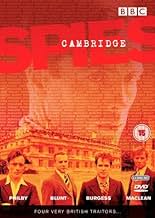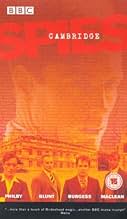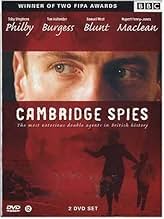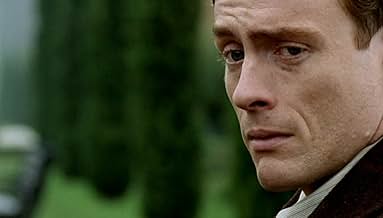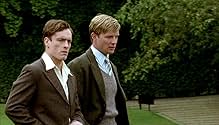Cambridge Spies
- Mini serie TV
- 2003
- 59min
VALUTAZIONE IMDb
7,4/10
2370
LA TUA VALUTAZIONE
Aggiungi una trama nella tua linguaThe true story of a group of Cambridge University Students who are recruited to spy for the Soviet Union in the early 1930s.The true story of a group of Cambridge University Students who are recruited to spy for the Soviet Union in the early 1930s.The true story of a group of Cambridge University Students who are recruited to spy for the Soviet Union in the early 1930s.
- Nominato ai 4 BAFTA Award
- 3 vittorie e 5 candidature totali
Sfoglia gli episodi
Recensioni in evidenza
High production values and a great story drive this excellent show along at just the right pace. Never rushed or drawn-out. A few oddities with the script - some things don't seem to flow right but minor. Perhaps the editor put a few bits of film in the wrong place! David Higgs' photography is a joy to watch - it would almost be worth watching without any sound! Aspiring DPs (directors of photography)should look at his lighting, framing and camera movement. Lovely use of long lenses to separate the characters from the background. Older DPs should start to worry!
What a superb series the BBC has made in Cambridge Spies! The cast are really fantastic. My favourite actor has to be Imelda Staunton as the late Queen Mother. She has some of the best lines and delivers them so well. The leads are cast very well indeed. Tom Hollander is suitably seedy as Guy Burgess, Samuel West is very starchy and upper class as Blunt, Rupert Penry-Jones is wonderful as the handsome but flawed Donald Maclean and Toby Stephens is delightfully dislikable as Kim Philby. These characters are thoroughly entertaining and horrible in the extreme in their betrayal of King and Country. The cloak and dagger feel of the piece is wonderful. The settings are really great too. Cambridge is so beautiful. The writers should be congratulated in keeping the pace moving so well. All in all BBC you have done it again. I wish we saw more quality drama like Cambridge Spies!
A very highly fictionalised account - but why did it need to be? The story of the Cambridge Five really did deserve better than this.
As drama it can't be faulted, but as a depiction of historical events it left much to be desired. We British are prone to look down upon the American TV movie, and for all the same reasons that were evident in the Cambridge Spies.
The story of the Five is well known enough for me not to have to point out the inaccuracies involved in this production, but beyond that I had no real sense of time and place, and certainly no sense of the evil these men did and the horrors and tragedies that came about as a result of their activities. In four hours there was room enough to get it right.
Some events were tick-boxed in glib exchanges, others rendered risible - the horror of Guernica reduced to one aged aeroplane with German markings, a mother, her son, the rattle of gunfire, the inevitable priest who rushes to the aid of the dead boy.
Philby lost his stammer, MacLean's bisexuality was never hinted at, Burgess became almost a paragon of virtue compared with the reality of the man, and Blunt...
The appeal of this series was, whatever the BBC might say, that it was based around real events. In that case I feel the viewer has a right to expect factual accuracy, otherwise the fictionalisation may as well have extended to the substitution of fictional names for the characters, and the excising of the "what happened next" text before the end-credits.
As BBC drama this was well up to standard, as BBC factual drama it took a long step in the wrong direction.
As drama it can't be faulted, but as a depiction of historical events it left much to be desired. We British are prone to look down upon the American TV movie, and for all the same reasons that were evident in the Cambridge Spies.
The story of the Five is well known enough for me not to have to point out the inaccuracies involved in this production, but beyond that I had no real sense of time and place, and certainly no sense of the evil these men did and the horrors and tragedies that came about as a result of their activities. In four hours there was room enough to get it right.
Some events were tick-boxed in glib exchanges, others rendered risible - the horror of Guernica reduced to one aged aeroplane with German markings, a mother, her son, the rattle of gunfire, the inevitable priest who rushes to the aid of the dead boy.
Philby lost his stammer, MacLean's bisexuality was never hinted at, Burgess became almost a paragon of virtue compared with the reality of the man, and Blunt...
The appeal of this series was, whatever the BBC might say, that it was based around real events. In that case I feel the viewer has a right to expect factual accuracy, otherwise the fictionalisation may as well have extended to the substitution of fictional names for the characters, and the excising of the "what happened next" text before the end-credits.
As BBC drama this was well up to standard, as BBC factual drama it took a long step in the wrong direction.
Well made and acted but I'm afraid it didn't have the guts to show the reality of the result of their treason. Why did we not see the suffering and death of the agents whom the Cambridge spies betrayed? Why did they never confront the hypocrisy of helping a regime which sides with Hitler, imprisons its' population and regularly executes their KGB contact agents? It tries to be sympathetic to men who put their loyalty to their friends above their loyalty to their country, their colleagues and those they're supposed to be protecting. What's more even that is incredibly flawed, Blunt abandons the rest of the group to their fate, Philby sleeps with McClean's wife and sends Burgess to accompany him into exile behind the Iron Curtain unaware that he's never coming back to the UK (and will quickly drink himself to death in Moscow).
What's more it only seems to tell half the story, concentrating disproportionately on the recruitment process and the influence of the Spanish civil war on the group. We get none of the fallout from the defection which was a revelation in Britain at the time or Philby's infamous press conference which is still cited today as a classic example of how to lie, we never get Philby's flight from Beruit or McClean and Caincross' plea bargain. Perhaps the most sympathetic character in the whole story is James Jesus Angleton who appears to be the lone voice in the wilderness.
So all told a great series but do some research first.
What's more it only seems to tell half the story, concentrating disproportionately on the recruitment process and the influence of the Spanish civil war on the group. We get none of the fallout from the defection which was a revelation in Britain at the time or Philby's infamous press conference which is still cited today as a classic example of how to lie, we never get Philby's flight from Beruit or McClean and Caincross' plea bargain. Perhaps the most sympathetic character in the whole story is James Jesus Angleton who appears to be the lone voice in the wilderness.
So all told a great series but do some research first.
While not unhistorical, this is a very garbled and misleading presentation of the spies in question. Presumably, historical truth is sacrificed for dramatic reasons. But Cambridge Spies doesn't manage to rise to the level of drama. It's melodrama. There are moments when, if you turn off the sound, you'd swear you were watching a not very good silent movie: sentimental and over-wrought. The Guernica scene is a case in point; Guy Burgess, emoting in the rain, lamenting the death of Julian Bell is another. Rather a waste of acting talent. The main characters in this effort have each done other work that displays their talents to much better effect.
Lo sapevi?
- QuizBased on the same real life events as Another Country - La scelta (1984), History in Faces: Cambridge Five (2011), Philby, Burgess e Maclean (1977), A Question of Attribution (1991), An Englishman Abroad (1983), La talpa (2011), La talpa (1979), Blunt (1987), Traitor (1971), Blade on the Feather (1980), Triplo gioco (1983) and influenced the source novels of Quarto protocollo (1987), The Innocent (1993) and others works such as Codice Homer: A Different Loyalty (2004) and Olding (2019), even in minor form like in The Imitation Game (2014).
- BlooperGuy Burgess is in a London flat eating Van Camps baked beans from a can. This brand is not available in England.
- Citazioni
Guy Burgess: Vladivostok, Moscow, the Kusnetsk Basin, Cambridge - the coldest places on Earth. Of the four, Cambridge is the coldest, permanently February the nineteenth.
- ConnessioniVersion of Philby, Burgess e Maclean (1977)
- Colonne sonoreJerusalem
by Hubert Parry
I più visti
Accedi per valutare e creare un elenco di titoli salvati per ottenere consigli personalizzati
Dettagli
- Data di uscita
- Paese di origine
- Sito ufficiale
- Lingua
- Celebre anche come
- Espías de Cambridge
- Luoghi delle riprese
- Aziende produttrici
- Vedi altri crediti dell’azienda su IMDbPro
Contribuisci a questa pagina
Suggerisci una modifica o aggiungi i contenuti mancanti

